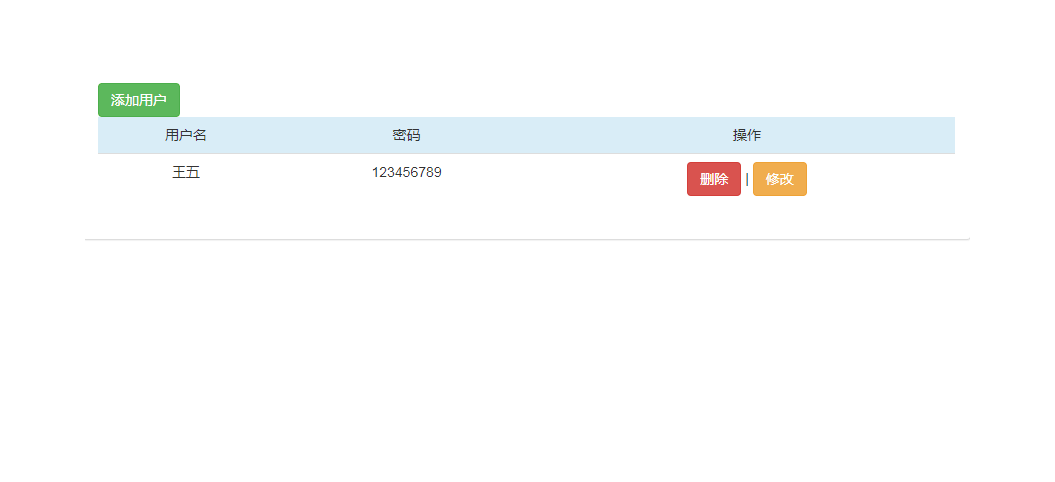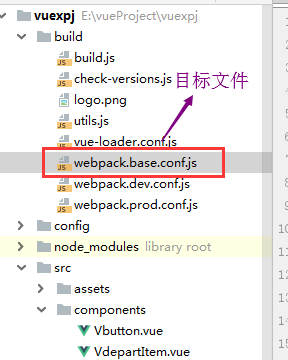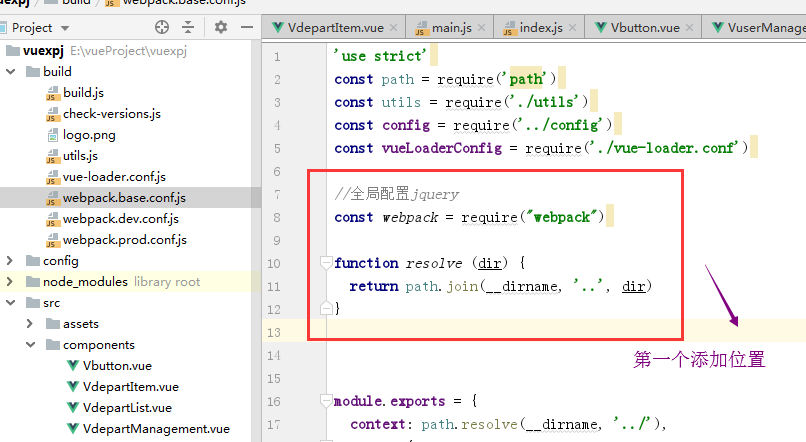一、实现效果

二、实现
(一)实现增加用户功能
Vuserlist组件中

<template> <div class="panel panel-default"> <div class="panel-body"> <!--<button type="button" class="btn btn-info" @click="addOneUser">添加</button>--> <Vbutton typeBtn="success" :btnUserMethod="addOneUser" >添加用户</Vbutton> <table class="table table-hover"> <thead> <tr class="info"> <td>用户名</td> <td>密码</td> <td>操作</td> </tr> </thead> <tbody> <VuserItem v-for="(item,index) in getAllUserList" v-bind:userinfo="item" v-bind:userid="item.id"></VuserItem> </tbody> </table> <div class="modal fade" id="addModal" tabindex="-1" role="dialog" aria-labelledby="myModalLabel"> <div class="modal-dialog" role="document"> <div class="modal-content"> <div class="modal-header"> <button type="button" class="close" data-dismiss="modal" aria-label="Close"><span aria-hidden="true">×</span></button> <h4 class="modal-title" id="myModalLabel">创建用户</h4> </div> <div class="modal-body"> <form id="fm" class="form-horizontal"> <div class="form-group"> <label for="username" class="col-sm-2 control-label">姓名</label> <div class="col-sm-10"> <input type="text" class="form-control" name="username" placeholder="姓名" v-model="getUsername"> </div> </div> <div class="form-group"> <label for="password" class="col-sm-2 control-label">密码</label> <div class="col-sm-10"> <input type="text" class="form-control" name="password" placeholder="密码" v-model="getPassword"> </div> </div> </form> </div> <div class="modal-footer"> <span id="errorMsg" style="color: red;"></span> <button type="button" class="btn btn-default" data-dismiss="modal">取消</button> <button type="button" class="btn btn-primary" @click="isSave">保存</button> <div class="hidden"> <el-button :plain="true" @click="open2"></el-button> <!--保存成功提示--> <el-button :plain="true" @click="open4"></el-button> <!--保存失败提示--> </div> </div> </div> </div> </div> </div> </div> </template> <script> import VuserItem from '@/components/VuserItem' import Vbutton from '@/components/Vbutton' export default { name: "VuserList", data: function () { return { } }, components: { Vbutton, VuserItem, }, methods: { addOneUser() { //修复修改数据后input有默认值的bug this.$store.state.UserObject.username=""; this.$store.state.UserObject.password=""; $('#addModal').modal('show') }, //保存成功提示函数 open2(){ this.$message({ message: '恭喜你,创建用户成功!', type: 'success' }); }, //保存失败提示函数 open4() { this.$message.error('对不起,创建用户失败!'); }, //发送数据 isSave(){ var data={ //通过计算属性获取数据,实际也是从store实例的状态中拿到数据 username:this.getUsername, password:this.getPassword, // csrfmiddlewaretoken: '{{ csrf_token }}' }; //在这个地方触发对应mutation方法,也就是gaddUser,通过ajax提交所有的数据 // this.$store.commit( // { // type: 'addUser', // data:data, // getUsername:this.getUsername, // getPassword:this.getPassword, // successfunc: this.open2, // failturefunc:this.open4, // } // ); this.$store.dispatch( { type: 'addUser', data:data, getUsername:this.getUsername, getPassword:this.getPassword, successfunc: this.open2, failturefunc:this.open4, } ); $('#addModal').modal('hide');//发送成功后模态对话框消失 this.getUsername=''; //添加成功后将input框置空 this.getPassword='' } }, computed: { getAllUserList() { return this.$store.state.UserList }, getUsername: { set(newValue) { this.$store.state.UserObject.username = newValue }, get() { return this.$store.state.UserObject.username } }, getPassword:{ set(newValue) { this.$store.state.UserObject.password = newValue }, get() { return this.$store.state.UserObject.password } } } } </script> <style scoped> table tr td{ text-align:center;//水平居中 line-height: 25px;//行高 vertical-align:middle;//垂直居中 } </style>
这里引入一个按钮的组件,也就是根据传入的参数,变成对应的不同cued按钮:
<Vbutton typeBtn="success" :btnUserMethod="addOneUser" >添加用户</Vbutton>
Vuserlist组件会向按钮组件传入它自己的函数名,然后在按钮组件中执行Vuserlist的方法:
<template> <button class="btn" :class="currentBtn" @click="handleClickParent"> <slot>按钮</slot> </button> </template> <script> export default { name: "Vbutton", data:function () { return {} }, props:{ typeBtn:String, btnUserMethod:Function }, computed:{ currentBtn(){ return { 'btn-success':this.typeBtn === 'success', 'btn-warning':this.typeBtn === 'warning', 'btn-danger':this.typeBtn === 'danger', } }, currentMethod(){ return this.btnUserMethod } }, methods:{ handleClickParent(){ this.currentMethod();//执行父类方法 } }, } </script> <style scoped> </style>
上面也就是子组件中执行父组件中的方法,详情可参考:https://www.cnblogs.com/shenjianping/p/11260397.html
执行addOneUser方法后弹出模态对话框,添加用户信息:
methods: { addOneUser() { //修复修改数据后input有默认值的bug this.$store.state.UserObject.username=""; this.$store.state.UserObject.password=""; $('#addModal').modal('show') }, }
当添加数据后执行保存数据,向后台接口发送数据的请求函数:
//发送数据 isSave(){ var data={ //通过计算属性获取数据,实际也是从store实例的状态中拿到数据 username:this.getUsername, password:this.getPassword, // csrfmiddlewaretoken: '{{ csrf_token }}'这里目前后端注释了csrf中间件 }; //在这个地方触发对应mutation方法,也就是gaddUser,通过ajax提交所有的数据 this.$store.dispatch( { type: 'addUser', data:data, getUsername:this.getUsername, getPassword:this.getPassword, successfunc: this.open2, failturefunc:this.open4, } ); $('#addModal').modal('hide');//发送成功后模态对话框消失 this.getUsername=''; //添加成功后将input框置空 this.getPassword='' }
可以看得到这里通过分发的方式,在main.js中执行action的异步操作:
//用于执行异步函数操作,并且提交的是mutation actions:{ addUser(context,payload){ $.ajax({ url:'http://127.0.0.1:8000/api/addUser/', method:'post', dataType:'JSON', contentType: 'application/json', //发送的数据类型为json,所以自己发送的数据必须保证为json data:JSON.stringify(payload.data), //发送json数据 success:function (data) { if(data.state){ payload.successfunc(); //执行保存成功提示函数 }else { payload.failturefunc(); //执行保存失败提示函数 } //保存返回的数据状态,mutation修改state状态,所以传给mutation处理 context.commit('ADDUSER',data); } }); }, }
这里最后提交的是mutation函数,因为只有mutation可以修改state,修改数据状态
mutations: { ////action中提交该mutation ADDUSER(state,data){ state.UserList.push(data.user); //将添加成功的数据添加到状态,用于页面更新 }, }
可以看到在store实例中定义的state状态:
state: { //这里面的状态跟每一个数据属性有关 UserList: [], },
(二)实现修改用户功能
在Vuseritem组件中

<template> <tr> <td>{{userinfo.username}}</td> <td>{{userinfo.password}}</td> <td> <Vbutton typeBtn="danger" @click="delUse" :btnUserMethod="delUse">删除</Vbutton> | <Vbutton typeBtn="warning" @click="editUser" :btnUserMethod="editUser">修改</Vbutton> <Vmodal :VmodalUserMethod="isdelUser"></Vmodal> <div class="modal fade" id="editModal" tabindex="-1" role="dialog" aria-labelledby="myModalLabel"> <div class="modal-dialog" role="document"> <div class="modal-content"> <div class="modal-header"> <button type="button" class="close" data-dismiss="modal" aria-label="Close"><span aria-hidden="true">×</span></button> <h4 class="modal-title" id="myModalLabel">修改用户</h4> </div> <div class="modal-body"> <form id="fm" class="form-horizontal"> <div class="form-group"> <label for="username" class="col-sm-2 control-label">姓名</label> <div class="col-sm-10"> <input type="text" class="form-control" name="username" placeholder="姓名" v-model="getUsername"> </div> </div> <div class="form-group"> <label for="password" class="col-sm-2 control-label">密码</label> <div class="col-sm-10"> <input type="text" class="form-control" name="password" placeholder="密码" v-model="getPassword"> </div> </div> </form> </div> <div class="modal-footer"> <span id="errorMsg" style="color: red;"></span> <button type="button" class="btn btn-default" data-dismiss="modal">取消</button> <button type="button" class="btn btn-primary" @click="isEditSave">保存</button> <div class="hidden"> <el-button :plain="true" @click="open2"></el-button> <!--保存成功提示--> <el-button :plain="true" @click="open4"></el-button> <!--保存失败提示--> </div> </div> </div> </div> </div> </td> </tr> </template> <script> import Vbutton from '@/components/Vbutton' import Vmodal from '@/components/Vmodal' export default { name: "VuserItem", components: { Vmodal, Vbutton }, data: function () { return { } }, props: { userinfo: { type: Object, require: true }, userid: { type: Number, require: true }, }, computed: { getUserId(){ return this.$store.state.UserId }, getUsername: { set(newValue) { this.$store.state.UserObject.username = newValue }, get() { return this.$store.state.UserObject.username } }, getPassword: { set(newValue) { this.$store.state.UserObject.password = newValue }, get() { return this.$store.state.UserObject.password } } }, methods: { delUse() { $('#delModal').modal('show'); }, editUser() { this.$store.state.UserId = this.userinfo.id; this.$store.state.UserObject.username = this.userinfo.username; this.$store.state.UserObject.password = this.userinfo.password; //模态对话框隐藏 $('#editModal').modal('show'); }, isdelUser(open2, open4) { console.log(this.userid); this.$store.dispatch({ type: 'delUser', data: {id: this.userid}, successfunc: open2, failturefunc: open4, }); $('#delModal').modal('hide'); }, //修改成功提示函数 open2(){ this.$message({ message: '恭喜你,修改用户成功!', type: 'success' }); }, //修改失败提示函数 open4() { this.$message.error('对不起,修改用户失败!'); }, isEditSave() { console.log(this.getUserId); this.$store.dispatch( { type: 'editUser', data: { id: this.getUserId, username: this.getUsername, password: this.getPassword }, successfunc: this.open2, failturefunc: this.open4, } ); $('#editModal').modal('hide');//发送成功后模态对话框消失 } } } </script> <style scoped> tr td { text-align: center; / / 水平居中 line-height: 25 px; / / 行高 vertical-align: middle; / / 垂直居中 } </style>
按钮组件:
<Vbutton typeBtn="warning" @click="editUser" :btnUserMethod="editUser">修改</Vbutton>
点击修改按钮执行editUser函数,并且将函数名传递给了按钮,这与增加一样的效果:
//在methods方法中
editUser() { this.$store.state.UserId = this.userinfo.id; this.$store.state.UserObject.username = this.userinfo.username; this.$store.state.UserObject.password = this.userinfo.password; //模态对话框显示 $('#editModal').modal('show'); },
可以看到在模态对话框显示前,做了两件事,第一件事是将用户id存在store实例中,第二件事是将用户的默认值填保存起来,实际上下面使用计算属性获取input框中的值,其中的getter方法就会获取默认值,用户id等值是从父组件Vuserlist传递过来的:
props: { userinfo: { type: Object, require: true }, userid: { type: Number, require: true }, },
利用计算属性获取默认值以及用户填写的值:
computed: { getUserId(){ return this.$store.state.UserId }, getUsername: { set(newValue) { this.$store.state.UserObject.username = newValue }, get() { return this.$store.state.UserObject.username } }, getPassword: { set(newValue) { this.$store.state.UserObject.password = newValue }, get() { return this.$store.state.UserObject.password } } },
最后就是发送修改过后的值:
isEditSave() { console.log(this.getUserId); this.$store.dispatch( { type: 'editUser', data: { id: this.getUserId, username: this.getUsername, password: this.getPassword }, successfunc: this.open2, failturefunc: this.open4, } ); $('#editModal').modal('hide');//发送成功后模态对话框消失 }
剩下的操作就与增加的类似了,这里不再过多赘述,删除操作也较为简单。详情参考github:
三、curd总结
1、绑定属性与非绑定属性传值
绑定的是数据属性,也就是类似for循环出来的属性或者data存在的属性都需要进行绑定
<VuserItem v-for="(item,index) in getAllUserList" v-bind:userinfo="item" v-bind:userid="item.id"></VuserItem> //userinfo或者userid属性
而对于非数据属性不要绑定,直接传值:
<Vbutton typeBtn="success" :btnUserMethod="addOneUser" >添加用户</Vbutton> //类似typeBtn属性
这两种绑定与非绑定属性都可以进行父子传值
2、获取input框默认值以及用户id
这里碰到的问题就是在VuserList中将每一个用户id传给Vitem了,但是在接收后使用过程中,每一个用户id都是数据表的第一个id,自己也不清楚问什么,但是这里将用户id接收过后存储在state状态中就会正确了,所以将传递过来的用户信息可以完全保存在state中,然后再使用。
const store = new Vuex.Store({ state: { //这里面的状态跟每一个数据属性有关 UserList: [], UserObject: { username: '', password: '' }, UserId:"" } }
3、子组件调用父组件方法
在父组件中将方法名传给子组件,然后子组件进行调用
//在父组件中
<Vbutton typeBtn="success" :btnUserMethod="addOneUser" >添加用户</Vbutton>
然后子组件Vbutton 调用
<template>
<button class="btn" :class="currentBtn" @click="handleClickParent">
<slot>按钮</slot>
</button>
props:{
btnUserMethod:Function
},
computed:{
currentMethod(){
return this.btnUserMethod
}
},
methods:{
handleClickParent(){
this.currentMethod(); //调用父组件中的方法
}
},
4、全局引用jquery
- 找到webpack.base.conf.js文件

- 添加配置
(1)添加参数的第一个位置
//添加全局配置jquery第一个位置 const webpack = require("webpack") function resolve (dir) { return path.join(__dirname, '..', dir) }

(2)添加参数的第二个位置
//添加全局配置jquery第二个位置 plugins: [ new webpack.optimize.CommonsChunkPlugin('common.js'), new webpack.ProvidePlugin({ jQuery: "jquery", $: "jquery" }) ],

